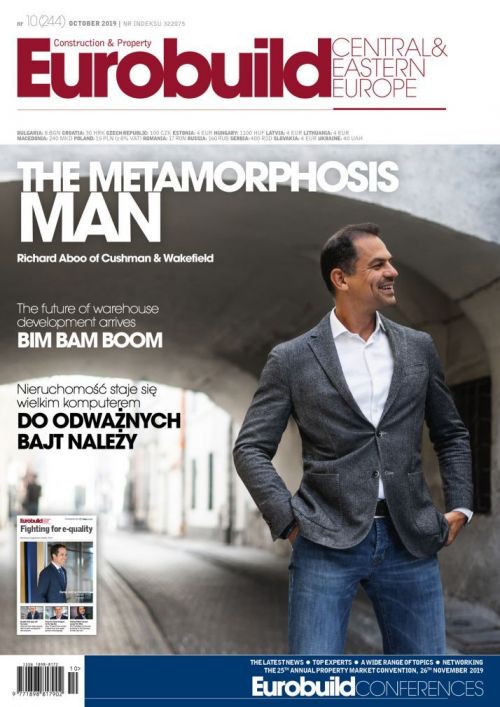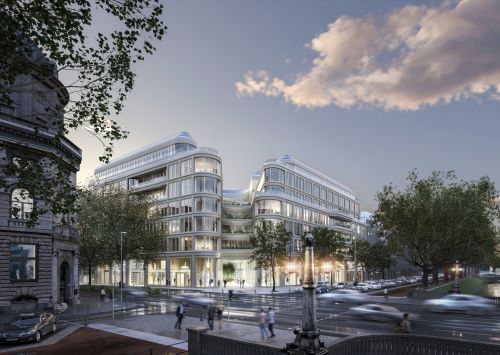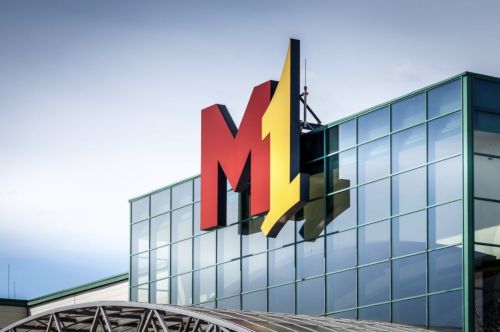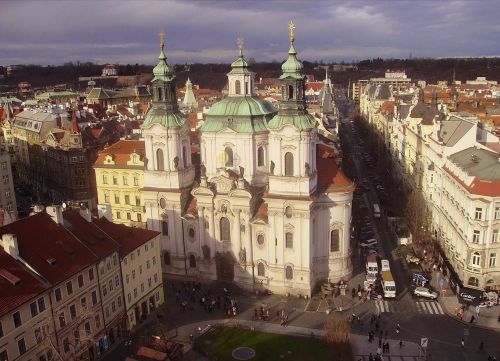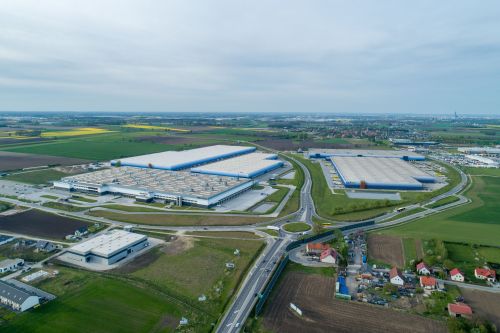The metamorphosis man
Office & mixed-use development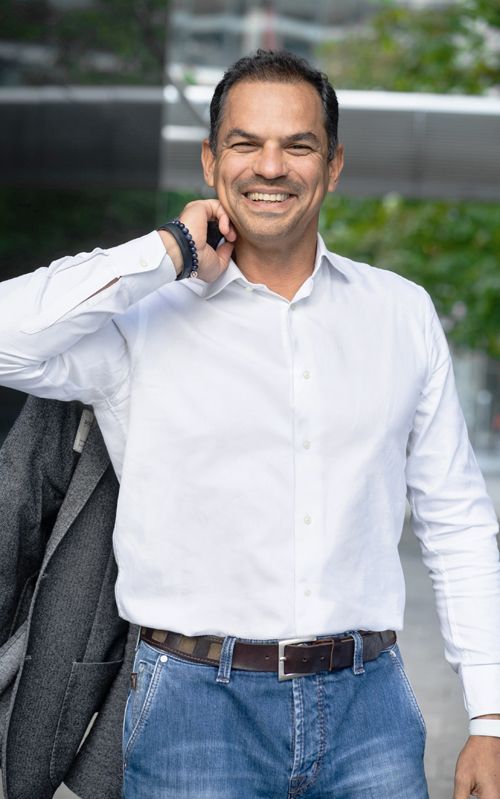
Nathan North, ‘Eurobuild CEE’: You’re from Kenya originally. How did you end up in Poland in the job you have today?
Richard Aboo, EMEA office agency chair, Cushman & Wakefield: I was one of the lucky few to receive a Kenyan government scholarship to study in Poland. I say lucky now, but frankly I didn’t think so then. It was my father who initially recommended that I consider Poland as a place of study at the time. Having travelled a few times to this part of the world he was able to see the “sea of change” that was coming – that a transformation was about to take place in the country and the region as a whole. Of course, at the time I was too young and ignorant to appreciate this and all I saw was a dark, grey and depressed nation… and I even had the feeling he was trying to get rid of me!
You later finished your MSc in economics at the Warsaw School of Economics and you’re now listed on its website as an eminent alumnus. Was it always in your mind that you wanted to be a real estate specialist? And did your studies at the Warsaw School of Economics prepare you for this?
No and no. The WSE didn’t prepare me for it. There was no real estate component in what I was taught at that time – and it was just by chance that I entered this market.
So you went straight from university into Cushman & Wakefield?
Not entirely. The company I started out with was affiliated to Healey & Baker by the name of PSI, which was founded by Richard Peterson. I initially joined as an intern and worked for the company for about eight months. I’m not quite sure what drew me to this company as most of my fellow students did their internships at large corporates, such as PWC, Procter & Gamble, Johnson & Johnson, etc. I guess I was drawn to the modesty of the advert that I saw on the school notice board. The PSI job ad was tucked away among all the large aggressive corporate ads. I also had no clue about real estate and only had Richard’s inspiring vision of how the market would transform. I have to say that yet again, as with my father, I decided to take a leap of faith.
So what was the Polish real estate market like back then? And how did you get from being an intern to having a permanent role in the company?
Now that I look back it’s really difficult to imagine how one could have operated in the market. There was limited research and only one property newspaper, The Estates Gazette, which resembled more of a property tabloid gazette than one that provided any meaningful information. In fairness there wasn’t that much to write about except for a few industrial or land transactions and the odd bit of market gossip. When I rejoined the company as a full time employee there was just a handful of developers. The market was extremely tight and even though there were fewer agents the competition was fierce.
Going from no market to the dynamic one we have today without a rule book must have meant you were writing it as you went along. How did you manage to operate in such a basic environment?
There was definitely no rule book and many of the tools we use today and to a certain extent take for granted were created back then. Of course, I do feel a certain amount of pride at having participated in the creation of how we operate in the market and the tools we use today, but also to have worked on some of the most important landmark office projects in the country, such as Rondo 1, the Metropolitan and the Warsaw Financial Center, which are still some of the most successful projects to date. It’s also incredible to see some of the projects I’ve worked on enter their second life, such as Ilmet (to be replaced by Warsaw 1), Ochota Office Park (now Adgar West) and Mokotów Business Park (now Empark), which were the first business parks in the country and the region!
So how then did you get from PSI to where you are today at C&W? And how has C&W changed in Poland since then?
It’s funny fact that although I’ve never changed my place of employment in a way it does feel like I’ve worked for four different companies. Effectively I’ve been through two mergers and two acquisitions and each time it felt like working for a different company… different branding, different strategies. But the market also underwent a total metamorphosis and Warsaw and the country as a whole in no way resembles what it was when I first started. I look back with awe at the resilience of the country and the entrepreneurial spirit of the Polish people to get the country to where it is now. It’s also great to see that the country has not rested on its laurels and to this day you still feel the drive and the energy of the market place.
But now your title and has changed.
Up until the end of last year I was responsible for the Polish office agency and until recently I had an overseeing role for the CEE region. I feel honoured to have developed and worked with a formidable team of talented specialists that is now in the good hands of Krzysztof Misiak, who now runs the Polish office agency. My role changes as of September to cover EMEA office markets, which I feel is testament to the amazing performance of the Polish branch and its office team and also serves as an indication that the CEE region is increasingly growing in importance.
What has been the most interesting or difficult deal you’ve been involved in?
Some of the most interesting transactions I’ve been involved in were with the late David Mitzner, the founder and co-owner of Apollo-Rida, in the leasing of space in its office skyscraper the Warsaw Trade Tower, which led to the subsequent successful sale of the building. This was in 2003 at the time of the dot.com crisis, when the market was totally stagnant. There was hardly any movement in the market and the hotels were literally empty. We were involved in the very first transaction in the WTT, a building located in the CBD, which effectively helped position a building that had suffered from a difficult reputation. How he managed to convince an adamant reluctant real estate director who initially didn’t even want to see the building to finally signing the very first deal in one of the most expensive buildings at the time was spectacular. Even at the age of 94 it was David Mitzner’s charisma and amazing energy that was the driving force behind the success of the project. He remains one of the most inspirational people I have had the honour to work with.
Just how surprised have you been by how the market has transformed and continues to change? And what do you find most surprising about the current market?
Virtually everything has changed in the market. To think that when I arrived in Poland there was hardly anything in the stores… to where we are now, with a market that now suffers from a saturation of shopping centres, is phenomenal in itself. If one was to take a snapshot of Warsaw in 1990 and compare it to the picture today it would be hard to believe that it was the same city. Richard Peterson’s vision of the future cityscape that he shared with me when I first started has not only come true but has actually exceeded all my expectations. There are not many cities in Europe today that are seeing this number of office towers constructed at the same time, and to think that most of them are virtually all leased or pre-leased is nothing short of remarkable. Warsaw is also a city that embraces change like no other. It is vibrant, clean, accessible and – from what was once regarded as an ugly place – has transformed itself into one of the nicest cities to live in, where the life-work balance is, in my opinion, close to optimal. The quality of its office buildings is world class and the pace of innovation and development of coworking space is impressive. Warsaw has become the fourth largest coworking market today, with the likes of WeWork expanding at lightning speed. And to think that this has happened in one-and-a-half years just goes to show the pace of change in the country.
But despite all these changes, has everything normalised and stabilised in Poland now – in terms of the economy?
What I have witnessed is change-upon-change – and even though I’ve been through a few recessions they were no comparison to when I first arrived in Poland. Nothing could have prepared me for what I experienced when I first arrived in Poland: empty shops, supermarkets selling nothing but bread and vinegar, shoe shops selling hundreds of shoes that all looked the same, meat shops that were empty and only supplied rationed portions of meat once a month, and queues of people everywhere. People had to queue up for everything – at the bank, at the post office, to pay bills, even to buy the basic essentials. It’s hard not to look back and appreciate where the country has got to. Today there are a number of things that function even better than in some of Western countries. The fundamentals of the country’s economy are strong, with sustainable growth rates of above 3 pct. Poland is now ranked as the fourth fastest growing economy in the world with a GDP of USD 600 bln. And to think that it was only USD 67 bln in 1989 when I first arrived! It had the lowest GDP per capita in Europe… even lower than Gabon!
How different is this market to the other “sea of change” countries you could have worked in?
I’ve travelled quite a bit around Eastern Europe, and Poland really does set itself apart and in many ways is regarded as exemplary! You can literally feel the energy when you get off the plane at Okęcie airport, the dynamism of the market and the strong entrepreneurial spirit. The country really has metamorphosed like no other country I know of in Europe. Everything has changed: the economy, the infrastructure, the banking system, the legal system and most of all people’s mentalities. Poles are well educated, well travelled, and open to new ideas and new technology.
So you have no regrets about forging your career in this particular country?
Looking back I wouldn’t have chosen any other country. To have witnessed the transformation of a country, an economy, a nation from almost nothing to where it is today is truly amazing and I feel proud to have been able to participate, albeit in a small way, in its development and where it is today. I certainly feel a sense of achievement and look forward to the next chapter in my career!
Transformative powers
Richard Aboo joined Cushman & Wakefield in 1996 and is now chair of the company’s EMEA office agency, succeeding James Young, who has been appointed to a new role as head of EMEA investor services. In his new role he will be overseeing 550 office specialists who last year advised on 4 mln sqm of transactions across the EMEA region. In 2015 he was made head of C&W’s office agency for the CEE region. Richard is one of the most experienced brokers in the Central and Eastern Europe. The annual volume of office lease transactions reached by his team came to more than 300,000 sqm of office space, including in such Warsaw properties as the Metropolitan, Focus, Platinium Business Park, Sienna Center, Eurocentrum Office Complex, ArtN, Europejski and Zebra Tower. He has also been responsible for C&W Poland’s corporate clients and has managed an advisory group specialising in pharmaceutical and banking companies in Central Europe. He also has experience in raising funds through borrowing or issuing bonds for the financing of development projects. Richard graduated from the Warsaw School of Economics with an MSc in Economics.
























